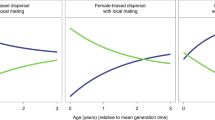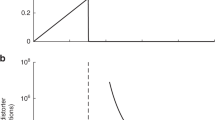Abstract
ACCORDING to the theory of kin selection first elaborated by Hamilton1,2, all individual behaviour is selected to maximise the increment to inclusive fitness ΔWi + ΣΔWjrij, where ΔWi is the effect of an act on the fitness of the actor, ΔWj is the effect of the same act on the fitness of a conspecific, and rij is the coefficient of relationship between the actor and the conspecific. Acts that lower an individual's direct fitness can thus be favoured by natural selection if, by conferring benefits on relatives of the actor, they cause a positive increment to the actor's inclusive fitness3,4. Since the average rij between an individual and the targets of its behaviour varies because of fluctuations in local population structure, an individual is most likely to secure a positive increment if its behaviour is conditioned on as accurate an estimate as possible of the particular local distribution of rij. I describe here a mechanism by which this estimate could be improved on the basis of information derived from the relative homozygosity of the individual's own genotype, in species with certain kinds of life histories.
This is a preview of subscription content, access via your institution
Access options
Subscribe to this journal
Receive 51 print issues and online access
$199.00 per year
only $3.90 per issue
Buy this article
- Purchase on Springer Link
- Instant access to full article PDF
Prices may be subject to local taxes which are calculated during checkout
Similar content being viewed by others
References
Hamilton, W. D., Am. Nat., 97, 354–356 (1963).
Hamilton, W. D., J. theor. Biol., 7, 1–52 (1964).
Hamilton, W. D., A. Rev. Ecol. Syst., 3, 193–232 (1972).
Trivers, R. L., and Hare, H., Science, 191, 249–263 (1976).
Wright, S., Genetics, 28, 114–138 (1943).
Wright, S., Am. Nat., 56, 330–338 (1922).
Taketomi, M., and Matsuo, T., Agric. Bull. Saga Univ., 6, 1–12 (1957).
Poiley, S. M., Lab. Anim. Sci., 22, 759–779 (1972).
Suneson, C. A., Agron. J., 48, 188–191 (1956).
Allard, R. W., and Kahler, A. L., Proc. 6th Berk. Symp. math. Stat. Prob., 5, 237–254 (1972).
Sakai, K.-I., and Gotoh, K., J. Hered., 46, 139–143 (1955).
Sakai, K.-I., in The Genetics of Colonizing Species (edit. by Baker, H. G., and Stebbins, G. L.), 215–239 (Academic, New York and London, 1965).
Allard, R. W., Kahler, A. L., and Weir, B. S., Genetics, 72, 489–503 (1972).
Kahler, A. L., Clegg, M. T., and Allard, R. W., Proc. natn. Acad. Sci. U.S.A., 72, 943–946 (1975).
Falconer, D. S., Introduction to Quantitative Genetics (Ronald, New York, 1960).
Leng, E. R., Crop Sci., 3, 187–190 (1963).
Author information
Authors and Affiliations
Rights and permissions
About this article
Cite this article
SEGER, J. Evolution of responses to relative homozygosity. Nature 262, 578–580 (1976). https://doi.org/10.1038/262578a0
Received:
Accepted:
Issue Date:
DOI: https://doi.org/10.1038/262578a0
This article is cited by
-
The meaning of intragenomic conflict
Nature Ecology & Evolution (2017)
-
Can altruism evolve in purely viscous populations?
Evolutionary Ecology (1992)
-
Competition relatedness and efficiency
Nature (1981)
Comments
By submitting a comment you agree to abide by our Terms and Community Guidelines. If you find something abusive or that does not comply with our terms or guidelines please flag it as inappropriate.



